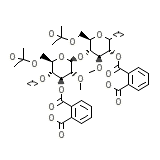Hydroxypropylmethylcellulose phthalate




Hydroxypropylmethylcellulose phthalate Brand names, Hydroxypropylmethylcellulose phthalate Analogs
Hydroxypropylmethylcellulose phthalate Brand Names Mixture
- 282 Mep (Acetylsalicylic Acid + Caffeine Citrate + Codeine Phosphate + Meprobamate)
- 282 Mep Tab (Acetylsalicylic Acid + Caffeine Citrate + Codeine Phosphate + Meprobamate)
- Equagesic Tablets (Acetylsalicylic Acid + Ethoheptazine Citrate + Meprobamate)
Hydroxypropylmethylcellulose phthalate Chemical_Formula
(C36H44O18)n
Hydroxypropylmethylcellulose phthalate RX_link
No information avaliable
Hydroxypropylmethylcellulose phthalate fda sheet
Hydroxypropylmethylcellulose phthalate msds (material safety sheet)
Hydroxypropylmethylcellulose phthalate Synthesis Reference
No information avaliable
Hydroxypropylmethylcellulose phthalate Molecular Weight
100000 g/mol (average)
Hydroxypropylmethylcellulose phthalate Melting Point
No information avaliable
Hydroxypropylmethylcellulose phthalate H2O Solubility
No information avaliable
Hydroxypropylmethylcellulose phthalate State
Solid
Hydroxypropylmethylcellulose phthalate LogP
No information avaliable
Hydroxypropylmethylcellulose phthalate Dosage Forms
Drops; Liquid; Solution
Hydroxypropylmethylcellulose phthalate Indication
Used to relieve dryness and irritation caused by reduced tear flow that occurs in certain eye diseases (keratoconjunctivitis sicca), recurrent corneal erosions, decreased corneal sensitivity, exposure and neuroparalytic keratitis, and as a lubricant for artificial eyes.
Hydroxypropylmethylcellulose phthalate Pharmacology
Cellulose is a linear polymer of ?-(1?4)-D-glucopyranose units. Cellulose is a mostly insoluble molecule consisting of between 2000 - 14000 residues with some preparations being somewhat shorter. Cellulose exists in two forms, amorphous and crystalline. Water cannot penetrate crystalline cellulose but dry amorphous cellulose absorbs water becoming soft and flexible. Cellulose has many uses as an anticake agent, emulsifier, stabilizer, dispersing agent, thickener, and gelling agent but these are generally subsidiary to its most important use of holding on to water. About a third of the world's production of purified cellulose is used as the base material for a number of water-soluble derivatives with pre-designed and wide-ranging properties dependent on groups involved and the degree of derivatization. Hydroxypropyl cellulose is one such example.
Hydroxypropylmethylcellulose phthalate Absorption
No information avaliable
Hydroxypropylmethylcellulose phthalate side effects and Toxicity
LD50=10200 mg/kg (oral, rat)
Hydroxypropylmethylcellulose phthalate Patient Information
Hydroxypropylmethylcellulose phthalate Organisms Affected
Humans and other mammals














